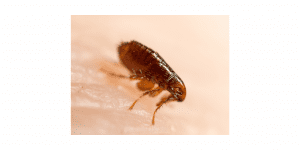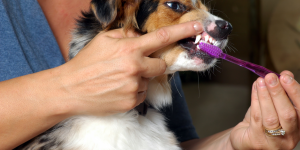Common Canine Health Conditions.
This Holidays4Dogs article will discuss a few of the more common ailments which dogs can suffer from. Most are easy to treat, but some could lead to more complicated problems if left untreated. Read on to find out more about common canine health conditions, including care and treatment.
Ears.
Ear problems are one of the most common health issues in dogs. Certain breeds are more susceptible to ear infections than others. Dogs with ‘floppier’ ears, like spaniels and Labradors, tend to suffer more with ear problems than other breeds. However, all dogs have ear canals shaped like an ‘L’ . This means moisture can become trapped creating the ideal environment for bacteria and mites to flourish.
Signs to look for:
Dogs with ear problems will often shake their heads, or scratch their ears/rub their face along the ground. Ears may be red, or swollen, There may be evidence of a brown sticky, or crumbly, substance inside the ear, which may indicate ear mites. Foreign objects, such a seeds lodged in the ear canal, can produce similar symptoms.
In addition, there might be an unpleasant smell coming from the ears. Any of these symptoms will need veterinary intervention, but could be easily treated. Ear problems can be very uncomfortable for the dog and is unlikely to improve, or get better, by itself.
Anal Glands.
The anal glands on a dog are a pair of small sacs, or glands, either side of the dog’s bottom (anus). Their function is also to drain toxins produced by the body. However, it is common for these glands to become blocked and infected.
Signs to look for:
If the dog is suffering from blocked, or infected anal glands, he might lick his bottom frequently. He may also drag his rear along the ground in an attempt to resolve itching and discomfort. Badly infected anal glands can become very sore indeed – especially when passing stools.
Owners may notice an unpleasant odour. If the dog frequents a grooming salon, most groomers will empty anal glands as a matter of course. However, chronic and persistent infections need veterinary attention. In some troublesome cases, removal of the anal glands is recommended.
Itchy Skin.
There are many reasons why a dog might suffer from itchy skin. This could be due to parasites, diet, or environmental factors. Long coated dogs can suffer from skin conditions brought about by insufficient grooming. Very heavily coated breeds, especially those with ‘double’ coats having a downy layer underneath and need very careful grooming to make sure that it is not just the top layer of coat that is being brushed. Coats like this can easily become so matted underneath that it creates an ideal environment for dirt and bacteria to become trapped. Itchy skin is a common canine health condition.
Signs to look for:
Obvious signs are a dog that scratches himself constantly. Other signs include frequent ‘nibbling’ of the skin and fur. The dog’s fur and skin can be checked for evidence of parasites. In long coated dogs, the fur should be checked thoroughly for any debris entangled
in the hair i.e. burrs, twigs, prickles.
It is possible to see fleas fairly easily with the naked eye. Some dogs can suffer with secondary allergies to fleas which can cause the skin to become extremely sore and angry.
Ticks can be spotted easily, but not usually until they have gorged themselves on blood. Once this happens the rear part of their bodies are bulbous and visible. They are about the size of a small grape. It is essential that ticks are removed carefully so that the head is not left embedded in the dog’s skin.
Many parasites are not visible to the naked eye. However, look out for red, cracked or sore skin. A vet can take skin scrapings to ascertain the species of parasite.
It is also possible that skin irritation can be caused by diet, or environmental factors such as pollen, or household products.
Eye Problems.
It is also a fairly common problem for dogs to suffer from eye infections such as conjunctivitis. Some dogs are sensitive to cold and windy conditions, which may make their eyes water. A common issue is a foreign body lodged in the eye – often grass seeds. There are also a number of eye problems which can affect dogs more seriously. These include congenital eye conditions and cataracts. Dogs with sight loss can often develop separation anxiety.
Signs to look for:
Evidence of eye conditions can include, weepy or runny eyes. This discharge may be clear, or could be yellow, or green in colour. Eye infections can lead to corneal scarring if left untreated. Older dogs, like humans, will often suffer from sight degeneration. It is therefore important to monitor this carefully so that the dog’s changing needs can be met.
Upset Stomach.
Upset tummy is another common canine health conditions. Dogs may suffer from upset stomachs during certain periods of their lives. This isn’t always a sign of something serious. However, it is essential that any signs of prolonged sickness, or diarrhoea, are addressed.
Likewise, constipation can be linked to poor digestion, but could also be associated with pelvic damage. Ingesting foreign bodies, or chemicals, may produce symptoms of an upset stomach. In this case, the dog will require urgent veterinary attention.
Signs to look for:
Diarrhoea is the most common symptom of digestive problems, but could relate to more serious conditions such as heavy worm infestation, parvovirus, kennel cough. Therefore, it is important to closely monitor the dog.
A dog may also salivate, or pant rapidly, when resting. This could be a sign of extreme abdominal pain and needs veterinary attention immediately. Abdominal pain and bloated tummy could be a sign of pyometra in female dogs.
Mouth Problems.
Problems in the mouth can be associated with poor diet, but can also be linked to gum disease, or teeth problems. Other more serious issues in the mouth are cancer of the gums, kidney disease, or viral infections.
Signs to look for:
Foul smelling breath is the first and, most common sign, there may be a problem with the dog’s mouth. However, the dog may also rub his face on the ground, or furniture.
He may also stop eating due to discomfort in the mouth. It is always sensible to check the teeth and gums for any obvious signs of disease such as redness, swelling, lesions, foreign bodies, or missing teeth. A veterinary examination is essential.
Conclusion.
If your dog is under the weather it is important to spot symptoms quickly. Early intervention is important in getting your dog back to his old self quickly. Even common canine health conditions, can lead to more serious issues if left untreated. Please head over to our other Holidays4Dog article for tips on finding a good vet.
Our Holidays4Dogs carers are experienced and dedicated to the welfare of dogs in their care. Should they notice anything unusual in guest dogs, they will always seek prompt veterinary attention – providing true peace of mind for owners.





